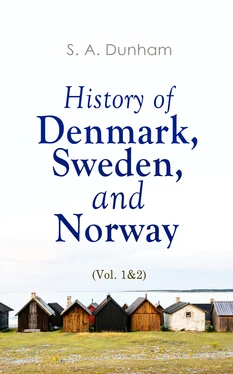1 ...8 9 10 12 13 14 ...32 According to the same venerable authority, namely, the Edda of Snorro, an attempt was made to recover the soul of Balder from the empire of Hela, or death. Who would undertake the perilous mission? It was Hermod, another son of Odin, that, at the entreaty of his mother, saddled Sleipner, the famous black steed, mounted him, and plunged into the subterraneous paths which led to the abodes of the dead. This Sleipner has a reputation never before enjoyed by quadruped. During the frequent contests between the gods and the giants—that is, between the Goths and the Jutes—the former were not always victorious; nor were they always sure of impunity within their fortress, well guarded as it was. One day an architect appeared before them and proposed to build them such a city that all the power of Jotunheim should fail against it. For this service, however, he must have his reward; and a splendid one it was, the goddess Freya to wife, with the sun and moon as her dowry. They agreed to his terms, provided he did what no doubt they believed impossible, viz., execute the work himself, within the space of a single winter; and they were liberal enough to allow him the use of his horse. In a short time the gods had reason to be alarmed; for the horse not only drew stones of vast magnitude, but did more of the architectural work than the master. Within three days of the completion of winter nothing remained but the hanging of the gates. In great consternation the gods assembled to consult by what means the ruin impending might be averted. As the covenant between them and the architect had been advised by Loke, they menaced him with death unless he discovered some expedient to save them. Loke, who has sometimes been called the Scandinavian devil, was fond of mischief; but he was fonder still of his life: and that very night he caused a mare to issue from a forest and neigh amorously. Sleipner, hearing the sound, left the work to pursue the mare, while the architect followed to recover his horse. Thus the whole night was lost. The architect now perceived that he must trust to himself. He resumed his natural size, and there he stood, a veritable giant—the everlasting enemy of the gods! They did not allow him to finish the work; but, regardless of their oaths, which in their opinion were not binding when made to a giant, they called on Thor to dash out his brains with the awful mallet. In the mean time the mysterious horse remained with the mare, and the issue of the connection was Sleipner with eight feet—the most excellent of all the animals ever possessed by gods or men. [45]
Such was the animal on which Hermod descended to the regions of Hela. The description of his journey is highly poetical. During nine days and as many nights, he travelled down the precipitous way—often abrupt—along the sides of yawning gulfs—through rugged valleys; and everything was involved in so great a darkness that he was obliged to grope, or trust to the instinct of his wondrous beast. At length he reached a river, the bridge of which was kept by a virgin called Modguder. She inquired his name, his race, his family; and expressed her surprise at his weight. “But yesterday,” she observed, “and three legions of dead rode over this bridge; yet all together did not shake it as much as thou alone. But thou hast not the look of one dead. What brings thee here?” He replied, “I am in search of my brother Balder; hast thou seen him pass?”—“I have: he rode over the bridge: the path to Hecate’s dark abode is still downwards, towards the north!” On he rode until he came to the gates of hell, which were closed to all but the dead. But he was not discouraged; plunging his spurs into his wondrous horse, he cleared the gate, and proceeded into a hall of vast extent. Here he perceived his brother, who filled the most honourable place. But far less honourable was it than the meanest in Valhalla, which Balder could not enter because it had not been his good fortune to die in battle. It is, however, some consolation for us, poor mortals, to perceive that hospitality is not forgotten in the gloomy regions below. Hermod remained the whole night; and the next morning he acquainted Hela with the anxiety of the gods, of men, of all nature, for the return of Balder, and besought her to permit it. She seemed to doubt whether the mourning for the hero was so universal as he had represented; but, to place the matter beyond dispute, she replied, that if all objects, inanimate no less than animate, would weep for him, the request of the gods should be granted. Hermod accordingly rose to depart. By Nanna he was intrusted with several presents for Frigga, his mother: from Balder he was the bearer of a ring (no doubt the one which had been placed in the funeral pile!) to their father Odin. He was then escorted to the outer gate as if he had been a favoured guest just leaving the palace of an earthly sovereign. On reaching Asgard, where Odin then was, he acquainted the gods with the message of Hela. By their advice agents were sent through all creation, praying everything to weep for Balder. By everything was the mandate obeyed, except by one old sorceress, who refused to weep, and said that Hela must keep her prey. [46]
But in the elder or poetical Edda—that of Sæmund the Wise, which in compilation is antecedent a full century to Snorro’s—the journey to the shades is attributed to Odin himself. When it was undertaken, Balder was yet alive, but dreams and portents afflicted him; and, after consulting the fates, Odin mounted his steed, Sleipner, and descended in darkness towards the abode of Hela, where a celebrated prophetess had been long interred. He met the terrible dog which the Greeks preserved in their mythology, and which, with bloody jaws, barked loudly as he passed along. Downwards he went, the earth trembling beneath his steed, until he reached the lofty hall of Hela. From the eastern gate he proceeded to the spot where he knew the tomb of the prophetess was to be found. Turning himself towards the north, he then commenced the fatal incantation, and placed in order the mystic rhymes. Many were the words of might which he uttered, until he forced the unwilling prophetess to raise her head, and to speak in the language of men. “What unknown mortal is he who has thus disturbed my repose? Bleached by the snow, beaten by the winds, drenched by the rains, have I long remained—long here I have been in the arms of death!”—“Vegtam is my name, the son of Valtam. [47]Tell me the secrets of hell, and I will tell thee what passes on earth. For whom are these costly benches, for whom these golden couches prepared?”—“This tempered mead, this liquid nectar awaits the arrival of Balder. Sorrowful are the sons of heaven. Unwillingly have I spoken; now my lips shall be closed.”—“Listen, prophetess, for I must know the whole. Whose hand shall deprive Odin’s son of life?”—“That of Hoder: he the bruiser shall be of Odin’s son, the spoiler of Balder’s life! Unwillingly have I spoken; now my lips shall be closed.”—“Listen, prophetess, for I must know the whole. Who shall revenge on Hoder the death of the hero? who shall bear the smiter of Balder to the funeral pyre?”—“Rinda, a virgin of the west, shall bear a son by Odin; he, when only one night old, shall slay the murderer. His hands he shall not wash, nor his head shall he comb, until he bears to the funeral pyre the enemy of Balder. Unwillingly have I spoken; now my lips shall be closed.”—“Listen, prophetess, for I must know the whole. Who are these damsels that weep at pleasure and raise their covered heads on high? [48]Say this only, and thou mayest sleep.”—“Ah! no wandering spoiler art thou, as I have hitherto believed: well do I know thee for Odin, the preserver of nations!”—“And thou art not Vala; no prophetess art thou; but the mother of the three infernal furies!”—“Odin, ride back to thine house, and there command! Never again will I be consulted by the living until Loke shall break loose from his fetters, and the dreaded twilight of the gods arrive!” [49]Such is the dark poetical legend which the genius of our poet [50]
Читать дальше












